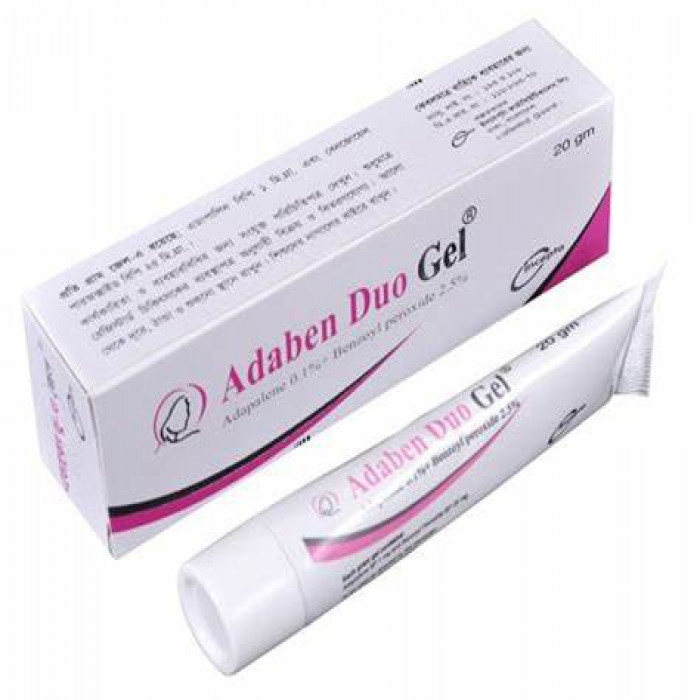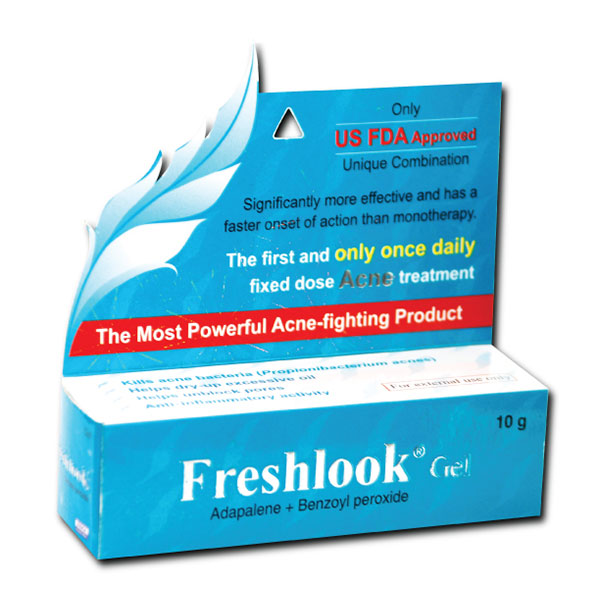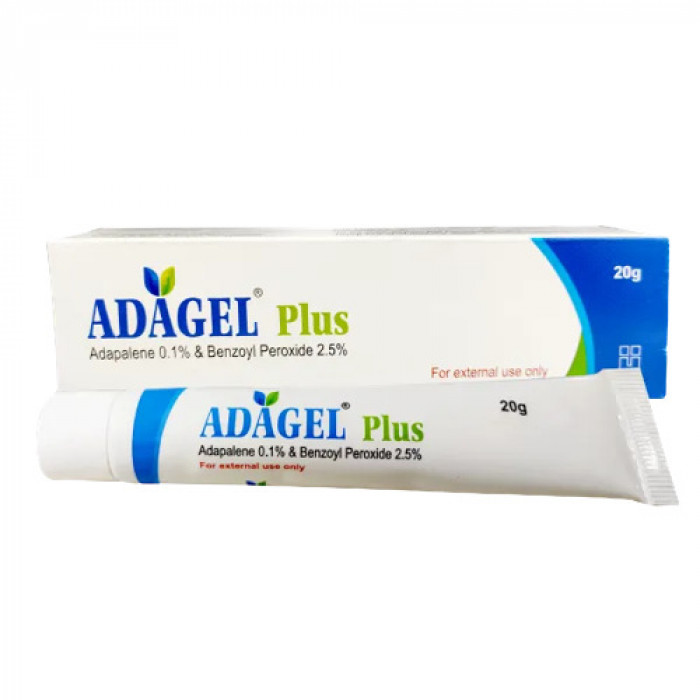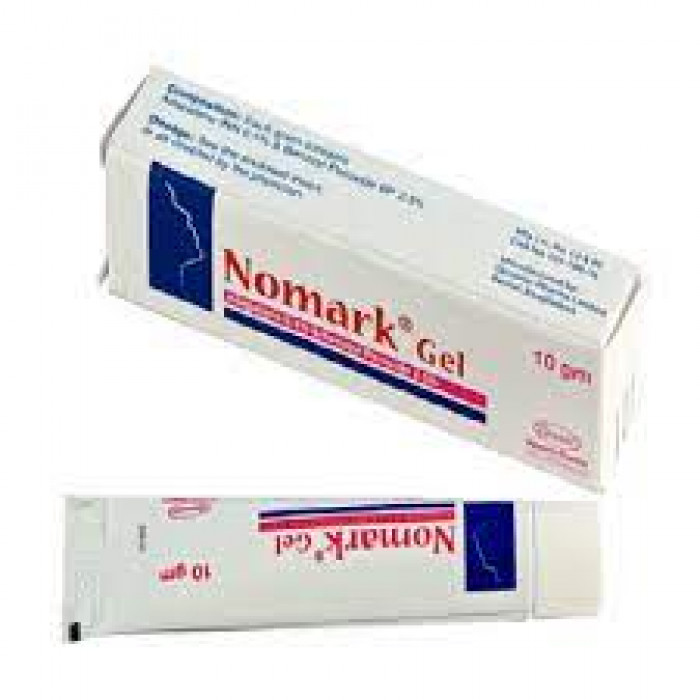
✔ 100% Authentic Product
👁️ Currently Viewing 4206
Adaben Duo Gel
Adaben Duo Gel (Adapalene 0.1 % + Benzoyl Peroxide 2.5%) is prescribed to treat acne in patients aged 12 and above.
Discount
Price: ৳ 190
MRP:
৳
200
5%
Off
✅ Description:
Adaben Duo Gel is a dermatological preparation classified as an 'antiacne' medication used to treat acne (pimples) and remove the upper dead layer of the skin. Acne occurs when hair follicles become blocked with dead skin cells and oil, providing a breeding ground for acne-causing bacteria.
This gel contains a combination of two drugs: Adapalene and Benzoyl peroxide. Adapalene, a retinoid, works by loosening skin cells on the surface and unblocking pores, reducing oil production, and decreasing pimples, whiteheads, and blackheads. Benzoyl peroxide, a keratolytic agent, breaks down keratin (a protein in the skin) to remove dead skin cells, softens the skin, and possesses antibacterial properties to kill acne-causing bacteria.
Here are some important instructions for using Adaben Duo Gel:
- Use as prescribed by your doctor. It is for external use only.
- Avoid contact with the nose, ears, mouth, or eyes. If accidental contact occurs, rinse with warm water thoroughly.
- Your doctor will determine how often you should apply the gel based on your condition.
- Possible side effects may include dry skin, scaling, local skin rash, irritation, redness, or a burning sensation, which usually resolves over time.
- Inform your doctor if you are allergic to Adaben Duo Gelor any other medications.
- Do not apply the gel on cuts, open wounds, sunburned, windburned, chapped, dry, or irritated skin.
- Avoid exposure to tanning beds or sunlight as it may increase sensitivity to sunlight and cause sunburn. Use protective clothing and sunscreen.
- Inform your doctor if you are pregnant or breastfeeding before using the gel.
- Do not apply excessive amounts or use for longer than prescribed, as it may increase the risk of side effects.
- Inform your doctor if you have eczema or sunburned skin before using the gel.
Safety Advices

Alcohol
UNSAFE
Caution is advised regarding the interaction of Adaben Duo Gel 20 gm with alcohol. It is recommended to consult a doctor before consuming alcohol while using this gel.

Pregnancy
CONSULT YOUR DOCTOR
Adaben Duo Gel is classified as a category C pregnancy drug, indicating potential risks to the fetus. It is generally not recommended for use during pregnancy. Pregnant women should consult a doctor before using this medication.

Breastfeeding
SAFE IF PRESCRIBED
Caution is advised when using Adaben Duo Gel while breastfeeding. It is unknown whether the gel is excreted in human milk. Therefore, it should be used by breastfeeding mothers only if the potential benefits outweigh the risks. It is also recommended to avoid applying the gel on the chest area to prevent contact with the baby.

Driving
SAFE
It is generally considered safe to drive or operate machinery while using Adaben Duo Gel, provided it has been prescribed by a doctor.

Kidney
SAFE
Adaben Duo Gel is considered safe for use in patients with kidney problems. However, if there are any concerns, it is advisable to consult a doctor.

Liver
SAFE
Adaben Duo Gel is considered safe for use in patients with liver problems. However, if there are any concerns, it is advisable to consult a doctor.
✔️ Uses of Adaben Duo Gel
- Acne
✔️ How does Adaben Duo Gel work?
- Adaben Duo Gel contains two active ingredients: Adapalene and Benzoyl Peroxide.
- Adapalene is a form of vitamin A that prevents the accumulation of sebum and unblocks pores, allowing natural exfoliation of the skin.
- Benzoyl Peroxide penetrates the skin and kills acne-causing bacteria.
✔️ Side Effects of Adaben Duo Gel
- Erythema (skin redness)
- Skin peeling
- Skin irritation
- Dry skin
- Burning/stinging sensation at the site of application
- Scaling
✔️ Quick Suggestions:
- Apply sunscreen or wear protective clothing while stepping out as it makes your skin more sensitive to sunlight.
- Avoid getting it in your eyes or mouth. If this happens, rinse with water immediately.
- Do not apply to broken, sunburnt, or sensitive areas of the skin.
- Be careful when applying to large areas as it can bleach hair, clothing, and furnishings upon contact.
- Inform your doctor if you are pregnant, planning pregnancy, or breastfeeding.
✔️ Acne/Pimple:
Acne, commonly known as pimples, is a prevalent skin condition that occurs when hair follicles become blocked with dead skin cells and oil, leading to the formation of various types of lesions such as pimples, whiteheads, and blackheads. While acne can affect individuals of all ages, it is most commonly observed during adolescence and teenage years due to hormonal changes.
Symptoms of acne can vary from mild to severe and may include:
- Pus-filled pimples: These are inflamed lesions filled with pus that appear as red bumps on the skin's surface.
- Whiteheads: These are non-inflamed follicular plugs that block the pores and appear as small, white bumps on the skin.
- Blackheads: These are non-inflamed follicular plugs that are open at the surface, exposing the trapped debris and appearing as small, dark spots on the skin.
- Red, large, and tender bumps: These are inflamed and painful lesions that may develop deeper within the skin and can be particularly uncomfortable.
Treatment for acne typically involves a combination of topical creams, cleansers, and oral medications, depending on the severity of the condition. Some common treatment options include:
- Topical creams and gels contain ingredients such as benzoyl peroxide, retinoids (e.g., adapalene), and antibiotics (e.g., clindamycin) to reduce inflammation, kill acne-causing bacteria, and unclog pores.
- Cleansers and washes containing salicylic acid or glycolic acid to help remove excess oil and dead skin cells from the skin's surface.
- Oral antibiotics such as tetracycline, doxycycline, or minocycline to reduce inflammation and kill bacteria when topical treatments are not sufficient.
- Hormonal therapies, such as oral contraceptives or anti-androgen medications, for females with hormonal acne.
- Isotretinoin (Accutane), a potent oral medication reserved for severe, cystic acne that does not respond to other treatments. It works by reducing oil production and preventing acne formation.
It's essential to consult a dermatologist to determine the most appropriate treatment plan for your individual needs and to monitor your progress effectively. Additionally, maintaining good skincare practices, such as gentle cleansing, avoiding excessive scrubbing or picking at the skin, and using non-comedogenic (non-pore-clogging) skincare products, can help manage acne and prevent future breakouts.
✔️ Pharmacology
Adaben Duo 20 gel is approved for the topical treatment of acne vulgaris in patients aged 12 and up. Adapalene, one of its active ingredients, binds to nuclear retinoic acid receptors, modulating cellular differentiation, keratinization, and inflammatory processes. This normalizes follicular epithelial cell differentiation, reducing microcomedone formation. Benzoyl peroxide, another active ingredient, acts as a bacteriocidal and keratolytic oxidizing agent.
✔️ Dosage & Administration of Adaben Duo Gel
- Check the label for directions before use.
- Apply a thin film of Adapalene & Benzoyl peroxide gel to affected areas of the face and/or trunk once daily after washing.
- Use a pea-sized amount for each area of the face.
- Avoid the eyes, lips, and mucous membranes.
- Do not apply to broken, sunburnt, or sensitive areas of skin.
- Be careful when applying to large areas as it can bleach hair, clothing, and furnishings upon contact.
✔️ Interaction of Adaben Duo Gel
Use concomitant topical acne therapy with caution as a possible cumulative irritancy effect may occur.
✔️ Contraindications
Do not use if hypersensitive to any of the components.
✔️ Pregnancy & Lactation
Should not be administered to individuals hypersensitive to any of its components.
✔️ Precautions & Warnings
- Avoid exposure to sunlight and sunlamps.
- Wear sunscreen when sun exposure cannot be avoided.
✔️ Storage:
Store in a cool (below 25°C) and dry place, protected from light and moisture. Keep out of reach of children, and keep the tube tightly closed after use.
⚠️Disclaimer:
At ePharma, we’re committed to providing accurate and accessible health information. However, all content is intended for informational purposes only and should not replace medical advice from a qualified physician. Please consult your healthcare provider for personalized guidance. We aim to support, not substitute, the doctor-patient relationship.









